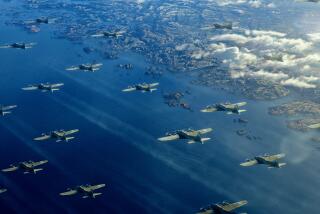Airplanes, Kafka and the new order
- Share via
In the preface to his latest book, “The Air Show at Brescia, 1909,” author Peter Demetz states matter-of-factly, “I think of the present volume as an ‘entertainment,’ to borrow Graham Greene’s term, not as a scholarly monograph, which I gladly leave to somebody else.”
Undoubtedly Demetz -- professor emeritus of German and comparative literature at Yale University -- could have produced that scholarly text himself. But instead he has written a quirky, fascinating book about a somewhat obscure historical event. His account is copiously researched and immensely entertaining.
In the fall of 1909, an airfield was built in the northern Italian city of Brescia, and the world’s leading aviators were invited to compete at a time when the spectacle of flight was something that many had never before witnessed. As interesting as the show itself was, Demetz pays just as much attention to some of the more notable attendees of the event -- among them, the flamboyant Italian poet Gabriele d’Annunzio; the composer Giacomo Puccini; and especially a 26-year-old lawyer named Franz Kafka, who also happened to be a writer.
Kafka showed up at the Brescia air show (“Il Circuito Aereo di Brescia”) with a few friends, including fellow writer Max Brod. The young men were among the thousands of others who showed up for the event, characterized by Demetz as “a unique encounter of resourceful engineers, daring pilots, visionaries from the provinces, and eminent artists and writers.” While Brod had already established himself as a writer, his friend Kafka had not, and Brod hoped that attending the air show might break Kafka’s writer’s block. It did. The two men planned to publish newspaper articles about the experience, and threw themselves into covering it. Demetz recounts the two roving reporters’ sharp but odd observations of the scene around them: Kafka, unimpressed by opera, described Puccini as having “the nose of an alcoholic.”
Kafka’s article appeared in a Prague newspaper on Sept. 29, 1909, having been trimmed quite a bit by his editor. Demetz analyzes (and quotes at length from) this remarkable piece of journalism for the virtues Kafka would later display in his fiction. Kafka’s style of reportage, which “moves between the exigencies of the newspaper genre and his own nascent habits of writing,” was full of his “personal attitudes, his special imagery, [and] his almost obsessive interest in physiognomy and gesture.”
Although Kafka is a central figure in this story, it also offers a wealth of other details, including a play-by-play description of the dramatic air show and the politics involved in making it happen. The Brescia event was clearly a matter of national pride, intended to upstage France, which had already held its own air show.
This was Italy’s first, with a total of 12 competitors in altitude, speed and “the best time in flying one or two passengers for a distance of at least nine kilometers.” Competitors included Italians and Frenchmen, and one American aviator, Glenn Curtiss, who ended up winning the grand prize and was celebrated as being “the fastest man on earth, or rather in the sky” and who the Italians thought of as “a kind of reticent, gangly Gary Cooper who went aloft in an ill-fitting suit.” Demetz doesn’t disappoint in taking a series of anecdotes, reports and strange facts (in his words, “a productive chaos of details”) and forming them into a comprehensive view of a defining moment in modern aviation. Although Demetz occasionally gets bogged down in minor details, those detours do not detract from the book’s more engaging passages.
For instance, the author describes the intense international coverage of the show, with more than 60 publications from around the world represented. Interestingly, although this event occurred nearly 100 years ago, the news media apparently hasn’t changed much. Demetz writes about the packs of eager reporters at Brescia, chasing after the famous people in attendance.
“The Air Show at Brescia” is surely valuable for its portrait of Kafka as a young man, chronicling his travels, writings and interests. Yet this is also a great story about aviation, told in a way that goes beyond an audience of avid flight buffs. Demetz conveys well the excitement stirred by air travel, and how meaningful the experience was to its bold pioneers. He also explores some of the troubling implications posed by aviation technology: As society yearned to travel farther and faster, where would this new technology take us?
The prescient young Kafka noted that flight instilled men with a giddy sense of their own power: “Watching planes ascending and landing for the first time in his life,” Demetz writes, “Franz Kafka had dim forebodings about humanity becoming too mobile and possibly alienating itself from its traditional homes and beliefs.” Or, as Demetz concludes, the air show “may have been the last luminous moment of a strange innocence, something rare that should not be forgotten.”
More to Read
Sign up for our Book Club newsletter
Get the latest news, events and more from the Los Angeles Times Book Club, and help us get L.A. reading and talking.
You may occasionally receive promotional content from the Los Angeles Times.










